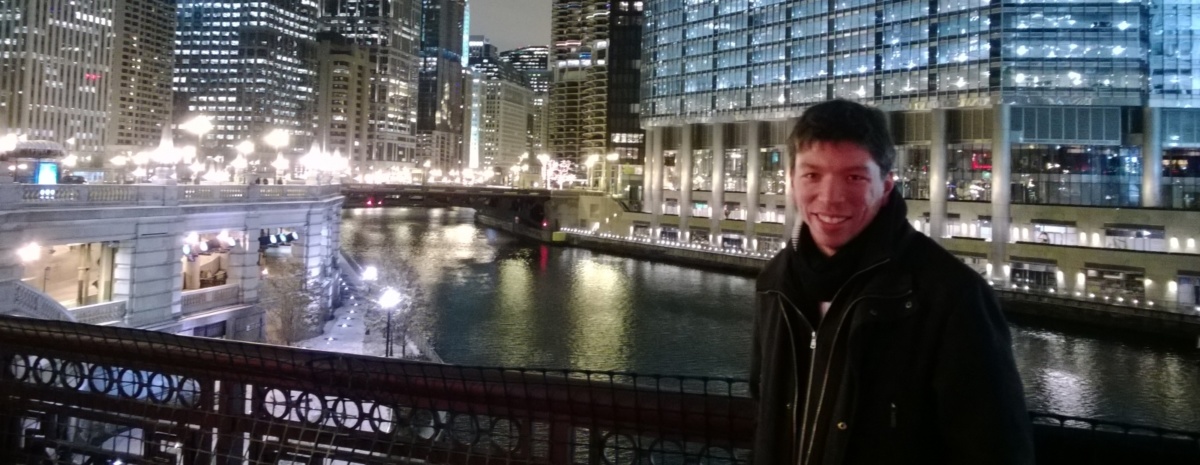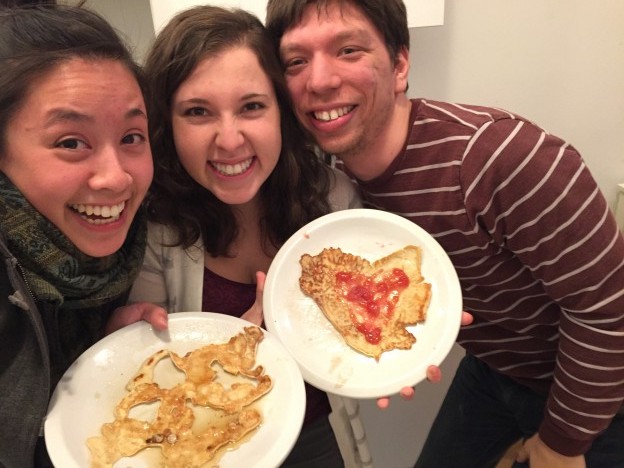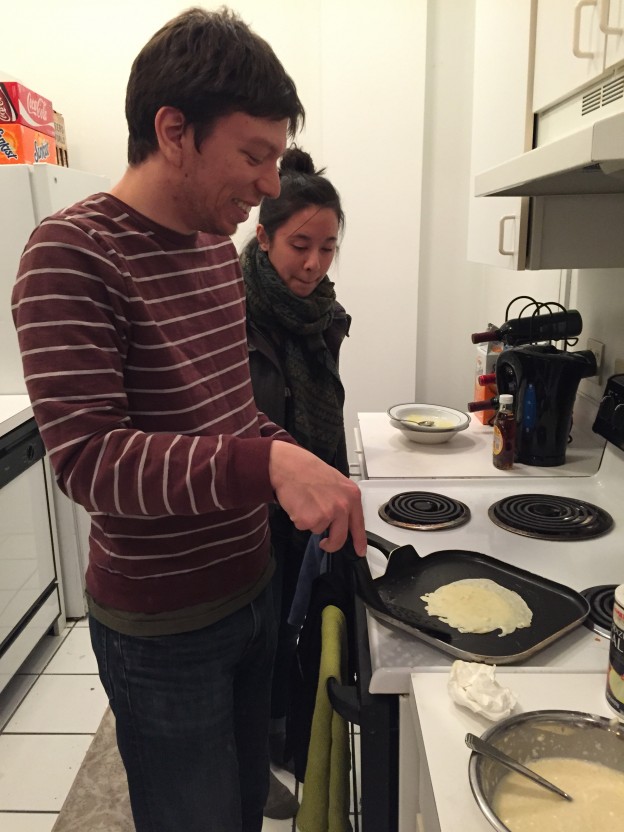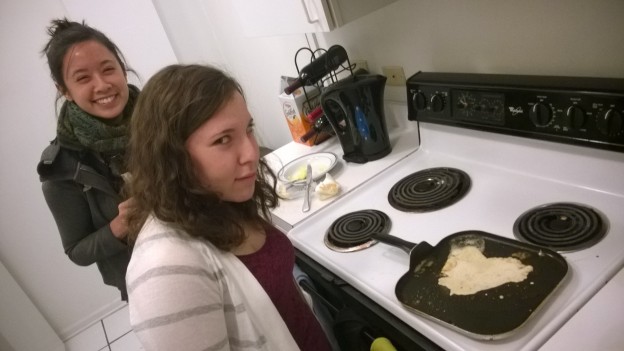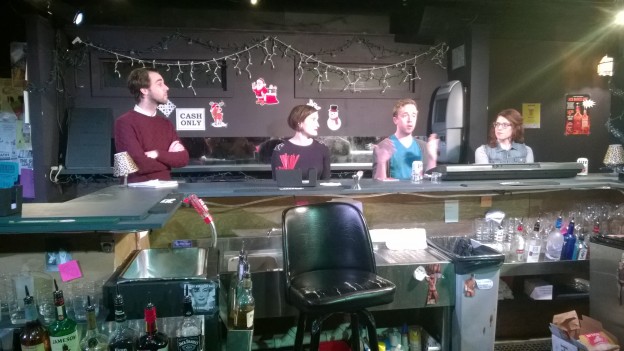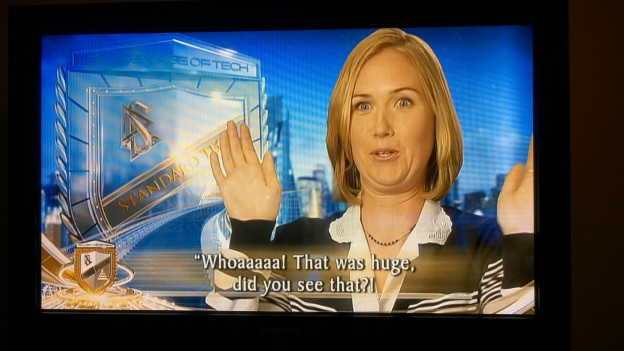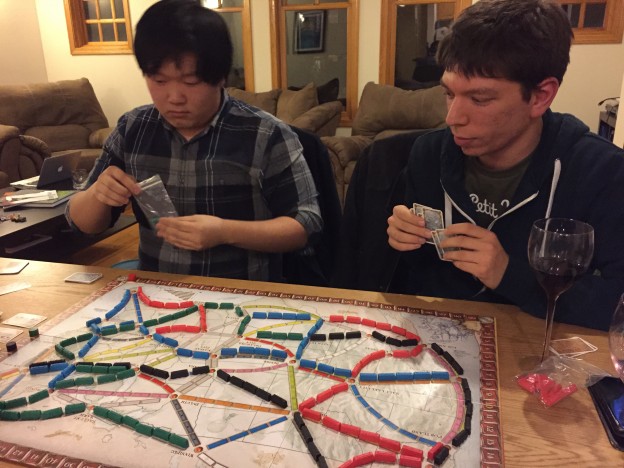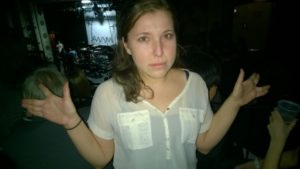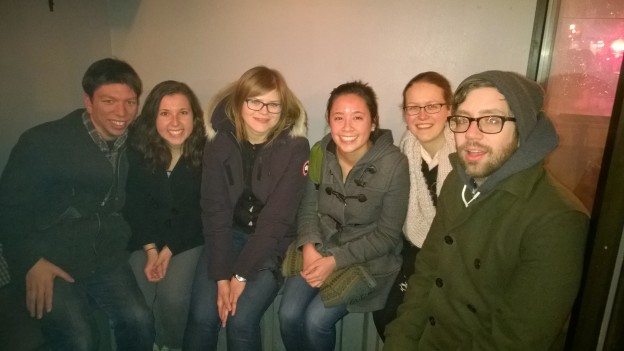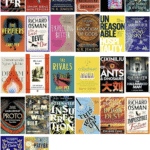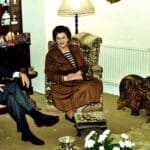It’s not that I was desperate to watch the Super Bowl – it’s that I wasn’t given a choice. Which is fair, given the “when in Rome…” attitude which led me to monster trucks last weekend. And the chore of sitting through the roughly seven thousand hours which comprise a single game of American football was considerably lessened by all the mimosas and cocktails at our boozy brunch beforehand. (A mimosa, in case you’re wondering, is just a more champagne-heavy version of Buck’s Fizz.) So by the time we ended up at Catherine and Jason’s on Super Bowl Sunday, the weekend before last, I was quite ready to settle under a blanket and espouse a muted but not altogether insincere passion for the Seattle Seahawks. Who lost. Obviously.
(I mock, but actually the final ten minutes turned out to be pretty exciting – even to me.)
More my natural habitat was a third trip to Improv Shakespeare (Penguins of Siberia this time – and still joyfully good) with Randi, Catherine, Jason, Nick and Constance. Somehow, before the show started we ended up talking about the UK law on knives. Rather uncontroversially, to my mind, they make it illegal to carry most knives around in public without “good reason”. But it was funny to see how it put the freedom-lovin’ heebie-jeebies on a bunch of people who would support greater gun control without a second thought.
Other fun stuff recently has included a temporary farewell brunch for Mark and Kristina. (I asked the three year old present what her favourite colour was. “Pink and purple”, she replied. “And what’s your least favourite colour?” She scrunched up her face for a few seconds to ponder the question and then, quite rightly, dismissed it. “I don’t have a least favourite colour.” Aren’t children interesting? Isn’t it impressive to be able to cognitively process a question, understand exactly what the expected parameters are supposed to be, but then actively challenge them when they don’t make sense?)
Randi and I also played a homemade edition of Coup with Anastasia, and I saw A Map of Virtue with a bunch of others after their Common Room appearance earlier in the week. “Part interview, part comedy, part middle-of-the-night horror story”, it claims, and I guess this is entirely right. I enjoyed it, but to steal verbatim from Shelby, “a play with so many unanswered questions is not the kind of play I love”.
What I have been recommending people watch is Adam Curtis’s new iPlayer-exclusive documentary Bitter Lake. (Obviously in reality available elsewhere for those not in the UK.) I realise, of course, that recommending a documentary about Afghanistan, Saudi Arabia and the making of the modern world which clocks in at over two hours long is a bit of a hard sell. But it’s shorter than watching the Super Bowl, and you don’t have to endure any tedious “discussion” adverts or halftime shows! Plus, as I emailed to a bunch of people I thought might just be interested:
Quite apart from being a fascinating history, it’s also very unusually filmed. Basically, he got access to all of the BBC’s archive of everything they shot in Afghanistan, including lots of bits of film which never usually makes it onto news broadcasts. Not everything falls into a pacey narrative: the film is long because he deliberately lingers on footage. But the end result (I think) is quite extraordinarily effect in forcing you to think about Afghanistan as a real place, rather than a ‘TV news’ place filmed in a ‘TV news’ way.
It’s a story which is never really told: how many people today discuss the Soviet experience in Afghanistan? But even if you don’t agree with all of his conclusions, I don’t think you’ll regret investing the time.
Later this week I am going back to New York after a far-too-long nine year gap. After that, I promise a blog post with more photos (definitely), less wordy paragraphs (maybe) and fewer brackets (not a chance).
We put down our $10.25 plastic cups of Budweiser to stand for the national anthem. As the arena goes dark, the screens fill with the American flag and stock footage of a bald eagle. Speaking strictly musically, it is a very odd song. By the time we get to “land of the free” cheering has already broken out – partly from pure relief, it feels like, of the singer’s successful scaling of the octaves.
When Katie first announced at work that she was going to a Monster Truck rally at the weekend, I laughed at her. By late evening, I was sending begging texts asking to come along. I can go to all the nice parties and restaurants here that I want, but there are nice parties and restaurants everywhere. Watching comically oversized trucks compete to spin around in circles and leap over dummy cars: this seemed like a reasonably American opportunity. (“…the 2014 Monster Jam tour schedule will unfortunately not include an event in the UK”, their website informs fans. They are, however, “working diligently to have Monster Jam return in 2015”.)
If you’re imagining something rugged and cowboy, you’re in for a disappointment. The keynote of Monster Jam is family-friendly, and most people are here with young children. Think sports entertainment, in much the same vein as wrestling. The atmosphere, diesel fumes and sticky floors aside, is really pretty sweet. Suitably cute children are picked from the crowd and rewarded with free tickets to next year’s event. (It’s OK, the promoters will make it back on the hot dogs.)
Those things which are culturally dominant are often invisible. So it is with monster trucks. The thrill of watching a failed jump – seeing the truck yield backwards to gravity and land upside-down with a thump, smashing its windows in the process – this is probably universal. We’re all secretly wondering if a bloodied driver is about to be pulled out from underneath… whether the lights will dim unexpectedly for an unexpected tragedy. Of course, it didn’t. Of course, everything was fine. But as we warm to the fake-danger on stage, half the audience has already slipped in their ear buds. We’ve become accustomed to a culture which sees nothing strange in this – like selling anoraks in the queue for a water ride. Spectacle shouldn’t just be risk-free – it ought to be discomfort-free, too. A reasonable aspiration, perhaps, but it pushes ever wider the gap between our controlled experiences and the messy complications of ‘real life’.
We walk back to the train station to get some exercise. It’s about 5 kilometres – waiting for the bus (or, of course, jumping in the car) would be as normal in Britain as in America. Less common are the half-hearted attempts at sidewalks, which – to be fair – are often buried in snow. Running across the intersections feels greatly more dangerous than anything back at Monster Jam, but it’s also quite exhilarating.
Near the station, we pass the Rosemont Public Safety building. Their insignia is a hammer crossed with a machine gun. There’s no sign of any ear buds, but I wouldn’t be surprised.
Sometimes, gifts fall into your lap as if from Lord Xenu heaven. The 7-minute Scientology infomercial DVD on ‘The Golden Age of Tech II’ – accidentally delivered to our flat – falls firmly into this category. Cleverly, they’ve made it parody-proof with a cast so zoned out of their minds, delivering lines so bonkers, that it would defy any attempt at exaggeration. (I can’t find it online, but it’s similar to this example from last year. Enjoy.)
Two weekends ago, Todd convened a salon (I’m writing this in italics to encourage you to read it with a French accent) to watch a film with rather more artistic merit: Wall-E. And then discuss it. And discuss it properly, like my beloved book club days, with starter questions to kick us off and a rewardingly wide-ranging discussion. Many thanks to the winter months for forcing everyone to stay inside and do this sort of thing.
Indoor activities this month also included a lot of board game activity with Catherine, Jason and AJ. Board games are funny, because I tend to forget their existence, until every now and then I encounter true aficionados (hat-tip, Oliver, Abi and Kat) which reminds me that the world has moved on from Monopoly. Don’t get me wrong, I have very happy childhood memories of trying to bankrupt my family with a strategically-placed property empire, but I have decided that any future family I have will also get to experience newer, better-designed games like Settlers of Catan or Ticket to Ride.
Together we also saw indie-pop band Jukebox the Ghost, who briefly looked like they might be heading for disaster when the keyboard failed to work. But after a few minutes, crisis was averted, and the crowd broke into the spontaneous chants of U-S-A which (it has since been argued) were ironic. I’m not so sure.
Talking of patriotism, I watched Tuesday night’s State of the Union address at Katie’s, while simultaneously inspecting the state of the union between her mac and cheese. Both were strong! Less strong were my bowling skills, as exposed on Friday night after Michele organised a get-together-and-try-to-knock-over-some-pins night. But bowling, much like board games, is (a) only taken seriously if you happen to be winning, and (b) much enhanced by alcohol. So what I lack in “super powers” and “ninja skills” of the Scientologists, I can more than make up for in the “happiness rundown” stakes. WELCOME TO THE GOLDEN AGE.
